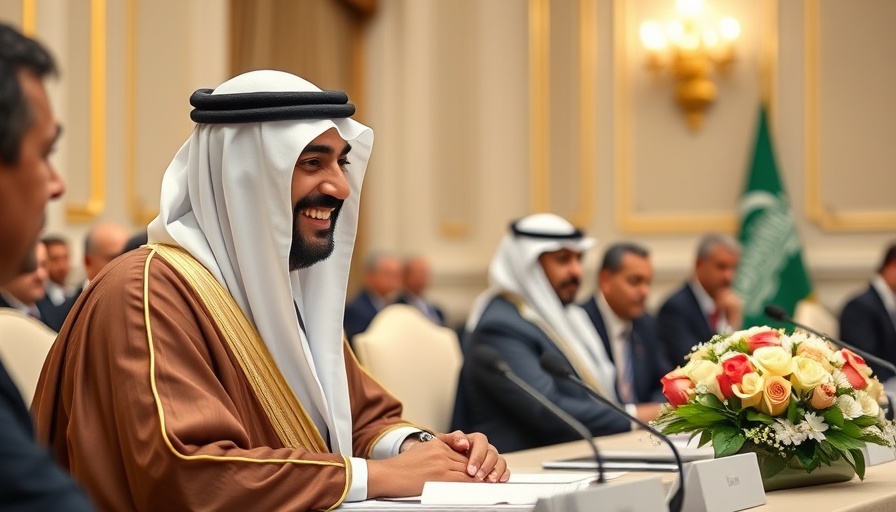
The Invitation and Its Implications
Recently, Canada extended an invitation to Saudi Arabia's Crown Prince Mohammed bin Salman to attend the upcoming G7 Leaders’ Summit in Kananaskis, Alberta. While it remains unclear whether bin Salman will accept the invite, this move highlights Canada's evolving diplomatic stance. Notably, this invitation marks a significant moment for Prime Minister Mark Carney's government, which has been actively re-engaging with leaders of countries that have experienced strained relations with Canada.
This gesture is noteworthy given that Saudi Arabia has historically been viewed as a crucial player in Middle East diplomacy. Positioned at the center of several pressing global issues, including ongoing humanitarian crises and geopolitical tensions, Saudi Arabia's participation at the G7 could influence discussions and decisions surrounding these topics.
Contextualizing Saudi Arabia's Role
Saudi Arabia's role in the current geopolitical landscape extends beyond its regional influence. The kingdom has participated in talks aimed at establishing a ceasefire in Gaza amid ongoing conflict, which has drawn international criticism for the humanitarian fallout. Furthermore, the nation has been part of discussions with the United States regarding the complexities of the war in Ukraine, an issue likely to dominate the G7 agenda.
However, despite its contributions to international diplomacy, Saudi Arabia’s human rights record remains a contentious topic. Critics, including Canadian officials and various advocacy groups, have raised alarm over the kingdom’s treatment of dissidents and its historical approach to women’s rights. Although Crown Prince Mohammed bin Salman has publicly touted reforms to improve women’s status, substantive concerns continue to linger.
Canada's Diplomatic Landscape
The decision to invite bin Salman falls within a broader strategy by Canada's leadership to reshape its relationships on the global stage. This is not the first time Prime Minister Carney has faced scrutiny over his government’s outreach to controversial figures. An earlier invite to Indian Prime Minister Narendra Modi sparked debates about Canada's stance on human rights abuses and authoritarianism.
These invitations reflect Carney's recognition of the necessity to engage with key global players, even those with mixed records in human rights. By inviting such leaders to the G7, Canada signals a willingness to consider pragmatic diplomatic relations, despite moral reservations.
Upcoming G7 Challenges and Opportunities
As leaders gather in Kananaskis, numerous pressing issues are poised to take center stage. From climate change to international security, the G7 summit serves as a vital forum for addressing global challenges. Engaging with leaders like bin Salman means balancing Canada's human rights advocacy with broader geopolitical interests. This can lead to potentially productive dialogues, but it also risks criticism if the summit fails to address human rights issues.
With the current backdrop of geopolitical tensions—chiefly, the war in Ukraine and instability in the Middle East—the potential outcomes of the G7 could be impactful. Leaders must find common ground while recognizing the importance of addressing critical humanitarian needs alongside facilitating political discourse.
Future Trends in Global Diplomacy
Looking forward, the role of large international summits like the G7 is likely to evolve. There is growing scrutiny from both domestic and international audiences regarding the effectiveness of such meetings in producing tangible results. As more nations grapple with issues of climate change, refugee crises, and human rights, the G7 must adapt to represent a diverse array of viewpoints and forge a path toward collaborative solutions.
For Canada, embracing a more engaged and diplomatic approach with controversial leaders could open doors for future collaboration on critical global issues. However, it also demands a careful navigation of public sentiment and internal political pressures, ensuring that the country does not compromise its values for the sake of diplomacy.
Conclusion: Navigating Complex Diplomatic Waters
Canada's invitation to Mohammed bin Salman to attend the G7 Summit is a balancing act between engaging with key international figures and addressing the complex moral narratives surrounding their leadership. As stakeholders consider the implications of this invitation, the discussions and outcomes of the upcoming summit will shape Canada's foreign policy trajectory. Engaging with differing perspectives while staying true to protecting human rights will be a continued challenge for Canadian diplomacy.
 Add Row
Add Row  Add
Add 




 Add Row
Add Row  Add
Add 

Write A Comment